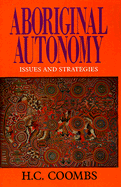Book contents
- Frontmatter
- Contents
- Foreword by Michael Dodson
- Preface
- Acknowledgments
- The Aboriginal World View
- Aborigines and the Land
- Aboriginal Lifestyles
- 5 Economic, social and spiritual factors in Aboriginal health
- 6 Aboriginal education and the issues underlying Aboriginal deaths in custody
- 7 Aboriginal work and economy
- Aborigines, Resources and Development
- Aborigines, Law and the State
- Asserting Autonomy: Recent Aboriginal Initiatives
- The Recognition of Native Title
- Conclusion
- Appendix: The Eva Valley Statement
- References
- Select Bibliography of work by H.C. Coombs
- Index
6 - Aboriginal education and the issues underlying Aboriginal deaths in custody
Published online by Cambridge University Press: 03 May 2011
- Frontmatter
- Contents
- Foreword by Michael Dodson
- Preface
- Acknowledgments
- The Aboriginal World View
- Aborigines and the Land
- Aboriginal Lifestyles
- 5 Economic, social and spiritual factors in Aboriginal health
- 6 Aboriginal education and the issues underlying Aboriginal deaths in custody
- 7 Aboriginal work and economy
- Aborigines, Resources and Development
- Aborigines, Law and the State
- Asserting Autonomy: Recent Aboriginal Initiatives
- The Recognition of Native Title
- Conclusion
- Appendix: The Eva Valley Statement
- References
- Select Bibliography of work by H.C. Coombs
- Index
Summary
Paper presented to Commissioner P Dodson, Underlying Issues Unit of the Royal Commission into Aboriginal Deaths in Custody, 1990.
It is not possible to consider the significance of education in shaping the social conditions out of which Aboriginal deaths in custody emerge, without taking into account the whole traditional process by which Aboriginal children are socialised to grow up as Aboriginal people; to acquire the beliefs, the patterns of behaviour, the values and the role models which they will express in their adult lives. These socialisation processes are comprehensive and coherent, involve every activity of the group and are geared to the lifestyle needs and purposes of its members. They are not separated and devolved upon particular members of the group, or delegated to external authority. This close integration of the educational process with the life of the group means that when the circumstances of the group are radically changed, the pattern of those processes adapts slowly. Where those changes are powerful and demand radical adjustments in relationship with other groups, conflict can emerge between the need to achieve those adjustments and the responses inculcated by traditional socialisation.
The hypothesis which I wish to put forward is that such a conflict exists between the assimilationist objectives of white Australian policies and the deeply ingrained attitudes and patterns of behaviour of Aborigines.
- Type
- Chapter
- Information
- Aboriginal AutonomyIssues and Strategies, pp. 66 - 75Publisher: Cambridge University PressPrint publication year: 1994
- 1
- Cited by



